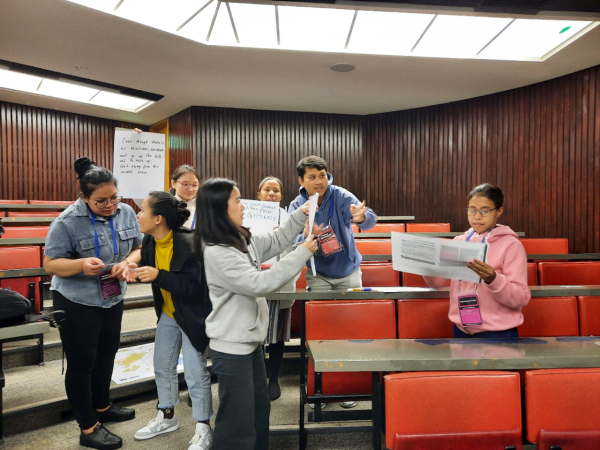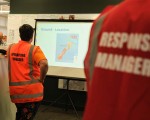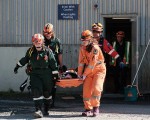Kia ora!
A new financial year is here and the community resilience team at WREMO are starting to see neighbourhoods come alive with renewed interest in preparedness now the dark months of winter are behind us!
In this quarters issue, we will talk about some of the successes of our team with the community. We will discuss ShakeOut 2023 and how you can participate and what other events we have coming up in this next quarter leading up to Christmas.
Successes!!
Doing Well in a Disaster - A Pilot
By Renee Corlett
There is a quote we use in our community resilience team: "Disasters break things, but they don’t have to break people”.
Unfortunately, this isn’t always the case. While we often focus on the physical side of preparedness such as storing water or creating a grab bag, post-disaster research continues to show the emotional impact lingers long after the physical cleanup is completed.
So, how can we prepare ourselves to navigate life's most challenging moments and get ourselves mentally as well as physically resilient?
We paired with Hummingly to create a 1-hour workshop about the impacts of making decisions in high-pressure situations such as a disaster or disruption. The first session was held on the Kāpiti Coast last month and covered topics such as understanding the effects of stress and techniques for managing uncertainty together.
Here are some key takeaways:
Prioritise moments of self-care and recovery in our daily lives so that you have something left in the tank when a disaster or disruption happens.
Recognizing how we personally handle stress empowers us to choose the most effective tools to call on when things get tough.
Being familiar with the stages of recovery after a disaster provides us with a valuable roadmap for what to anticipate and can lessen some of the uncertainty after an event.
We received great feedback from this session and participants said it felt good to think more about the psychological aspects of preparedness.
If you have a group interested in hosting this workshop, reach out and let your local Community Resilience advisor know.
A Community Response Practise with a Twist!
By James North

The NZ English Language for officials or NZELTO programme is funded by MFAT and run at Victoria University. This year they had 32 participants from across Southeast Asia, all of which work in the emergency management field, what an opportunity to showcase Wellingtons fantastic community response to a disaster!!
We started our community response practise in a lecture hall at Victoria University. It's clear that this lecture theatre has seen many interesting and instructive presentations over the years, but I doubt it has seen anything quite like a community emergency response practise!
We delivered our initial presentation on what is a Community Emergency Hub, what could happen at a hub and how communities could organise themselves to start solving problems.
Then came the fun part!
We broke the room into two randomly selected groups and gave group one a box. In the box was everything they would need to organise themselves and be able to start solving problems. They dived in, eager to divided up roles and start setting up their stations. Five minutes later, group two came in sporting injects that ranged from a child who had lost their mother to a pushy reporter wanting a scoop!!
Now, you don’t need to be a good actor to participate in a community response practise, reading the injects will do, but let me tell you, these students were all in!! The acting was sublime, well, maybe not sublime, but they really gave it their all. As more and more students of the second group came in acting their roles, the room descended into utter chaos.
I know what you're thinking, this sounds like a bad thing. But actually, it is completely expected. The art of setting up and running a Community Emergency Hub is not having complete control from the get-go. That's not realistic. The art is bringing order from chaos. And it was a joy to stand at the front of that room and watch as slowly things moved from chaos, people unsure where to go, who to speak to and what to do - to clearly designated areas, organised sections and furrowed brows becoming wide smiles. The needs and offers desk were even able to link that lost child up with their family! What a win!
The session came to a close after the second group had had their turn setting up and running a hub. Questions came thick and fast and, of course, one of my favourite questions was asked. “Who is trained to run the hub”. My answer? “No one!” (Some shocked faces in the audience). “We do not train specific people to run a Community Emergency Hub as this model is designed so that anyone, from any background, with any skill set can run a hub! One hour ago, you had never heard of a Community Emergency Hub. Now you have set up and run one, twice!”
Watching as the students left the lecture theatre, I heard the buzz of the room and chatter about what they had just been a part of and I’m proud to think that our model for community response to a disaster, developed here, in Wellington, may just have found it’s way offshore…
ShakeOut 2023

It’s that time of year again and not long to go!! ShakeOut 2023 is our national earthquake drill and this year has been set to happen on:
Thursday 19th October at 9.30am.
So, why is it important to participate in this drill? Can it benefit me? Will it help me take the right action at the right time?
The answer is yes, by practising what to do when the shaking starts, our bodies build muscle memory, and we can prepare ourselves to take immediate action.
Still not convinced? Well, let me tell you a story...
The year is 1999 and a company's Director of Security is making all the staff in their high-rise building do yet another fire evacuation drill. Grumbling can be heard up and down the office "Every quarter, really?" "Oh, for goodness sakes, I just made my coffee" "These reports won't file themselves!!". See at this time in our recent history, fire drill weren't mandatory in the USA and actually, not many people did them.
And so the drills carried on, Drill, Grumble, Drill, Grumble, Drill, Grumble.
Until it happened.
September 11th, 2001.
The building was the south tower, the company was Morgan Stanley and the Director of Security was Rick Rescorla. They had 2700 employees in the building at the time of the attacks. Only 13 didn't make it out. Many of those who survived attribute their survival to those fire drills, knowing what to do and not delaying, freezing or looking to see what others were doing.
So we see that practising for a disaster helps us develop the tools to get through. Come ShakeOut day this year, Drop, Cover and Hold. Try to encourage those around you to practise as well or speak to your place of work about what they are planning on doing for Shake Out day.
To participate sign up here
Upcoming Events
Newtown: Emergency Response Practise - October 8th
Ōtaki: Faster, Safer Tsunami Evacuation Workshop - October 12th
ShakeOut: 2023 - October 19th
Te Horo: Faster, Safer Tsunami Evacuation Workshop - October 19th
Karori: Emergency Response Practise - October 25th
Waikanae: Faster, Safer Tsunami Evacuation Workshop - October 26th
Ōtaki: Community Tsunami Practice - October 28th
Ōwhiro Bay: Emergency Response Practise - October 29th
Churton park: Emergency Response Practise - November 4th
Hataitai: Emergency Response Practise - November 12th
Mt Cook: Emergency Response Practise - November 26th
Waikanae: Emergency Response Practise - December 3rd
For full details see the events page on our website here.
Don’t see your area in our upcoming events, no problem!!
You can come along to any of our emergency response practises or better yet let us know if your community is keen to have a go at your local Emergency Hub.
It’s free, it’s fun and best of all anyone can do it!!
Contact us on info@wremo.nz and let us know if your community is keen for go!

